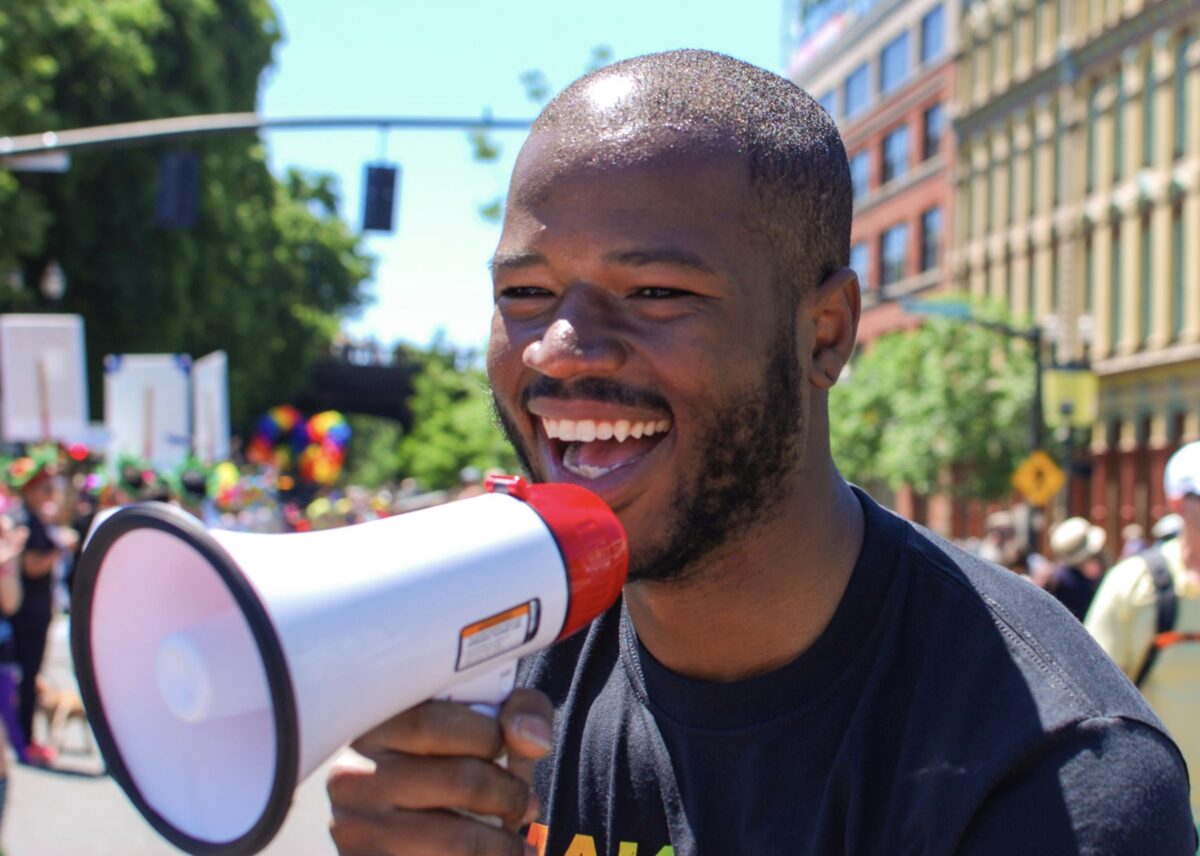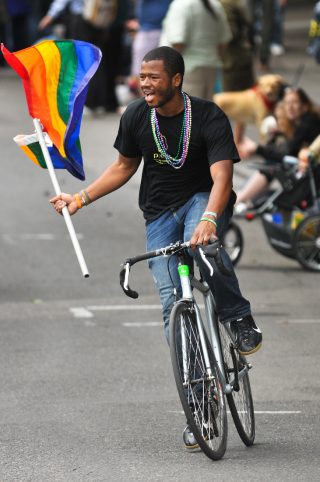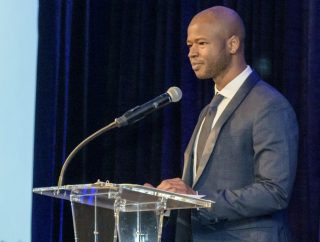
(Photo: Whitten For Oregon)
This post was written by Cameron Whitten. You might also be interested in a similar post from another candidate in this race, Chris Smith.
“As a street kid, I didn’t have the money to afford my own housing, let alone a car or bus fare.”
My journey to becoming a lifelong cyclist is a unique one.
As a child, my home life was filled with emotional and physical abuse. The pain I experienced at a young age felt like a crushing weight on my aspirations and self-confidence. At the age of eighteen, I found the courage to leave the East Coast and everything I knew behind. I was fueled by a desire for a real shot at defining my own future.
Within a few months I found myself living in a homeless youth shelter in Portland. The challenges my peers and I faced provided a unique perspective into the inequities deep within our society. But I also immediately fell in love with Portland, because even as a queer, homeless, Black kid— I found a level of safety and acceptance here that I never had in my childhood.
As a street kid, I didn’t have the money to afford my own housing, let alone a car or bus fare. One day, the homeless youth nonprofit where I received services partnered with Community Cycling Center to distribute bikes. The one I got was black, rebuilt, and the first bicycle I could completely call my own.
I discovered newfound freedom through cycling, and I began to actively question our society’s prioritization of cars.

(Photo © J. Maus/BikePortland)
That questioning led me to become an outspoken Portland activist. At the age of 20, I became involved in the Occupy Portland movement, then ran for Mayor of Portland in a field of 23 candidates. I campaigned on a platform of environmental justice, which included strong opposition to the proposed Columbia River Crossing freeway expansion and industrial development of West Hayden Island. I didn’t win that election, but that experience planted the seeds for me to grow up in Portland’s civic culture. And thanks to the work of many people standing up for Portland’s values, West Hayden Island remains protected and the mega-bridge CRC project was canceled.
Transportation justice has been a core issue for me since my earliest days of activism. In 2013, I became a founding member of the coalition to overturn the state’s then-ban on Inclusionary Zoning, a policy which meets at the intersection of transportation and housing justice. By 2016, the coalition successfully pushed for the passage of landmark legislation; and cities like Portland can now require developers to provide a percentage of new units in larger buildings at affordable rents.
Early into my activism, I saw how my skin color, age, and lived experiences created barriers to my inclusion at decision making tables. I tried to join the Portland Housing Advisory Committee and the Planning and Sustainability Commission, and was denied by both. In 2014, I enthusiastically joined the Portland Bureau of Transportation’s Bureau Advisory Committee.
The next year, I was arrested while riding the Portland streetcar, a painful story I only recently shared in full. In the wake of that evening, my presence on the committee became less welcome by staffers, which to me seemed to stem from a fear that I was going to file a lawsuit. Once again my voice felt silenced, and I resigned before the end of the year.
The roadblocks I faced at the City did not stop me from pushing for change. I became an inaugural member of TriMet’s transit equity advisory committee, and for three years I dug into work on low income fares, fare extensions, equity implications for Hop Pass, and equitable service improvements. The difference in this experience was that TriMet’s Equity Director at the time was a Black man in leadership who understood the barriers I faced, and provided the trust and support I needed to succeed.
Advertisement
Together, these moments were a springboard into my leadership as a nonprofit CEO. In the nonprofits I’ve led, I’ve doubled fundraising budgets and built more inclusive staffing and programming. I’m especially proud of the work I’ve done to address the historic injustices of Black community in North and Northeast Portland. (Read more about my accomplishments here.)
“… The benefits of our progress have not been equitably shared, and those disparities are undermining our future success.”
Despite the systemic roadblocks I’ve faced in life, I’ve found a way to carve my own place at the table—and sometimes I’ve had to build completely new tables. Because of that lived experience, I know exactly how critical it is to make space for others every step of the way.
This is one of the main reasons I’m running for Metro Council. Metro is at the heart of so many critical decisions for our region— accessible parks, affordable housing, transportation choices, livable neighborhoods, and equitable opportunities. These decisions must center the voices of those who will be most impacted. The hard truth is that people like me—people who have historically been underrepresented at tables where decisions are made—have been negatively impacted by decisions past and present.
Clearly, Portland has a progressive history to be proud of. We led on the urban growth boundary, burying Harbor Drive and building Waterfront Park, resisting the Mount Hood Freeway, and passing beach and bottle bills, bike plans, transit investments, and more. But at the same time, our legacy of discrimination has tarnished that progress: exclusion laws, the flooding of Vanport, redlining and disinvestment, urban renewal, and predatory housing practices, to name a few.
We like to think of redlining as a thing of the past, but it isn’t. The lines have only been re-drawn and re-imagined.
Our marginalized communities are still here, and they are living in environmentally distressed conditions. A glaring example is a recent study by Jeremy Hoffman, Nicholas Pendleton, and Vivek Shandas of Portland State University of how hotter climates disportionately impact redlined communities in North Portland and working class neighborhoods in St. Johns and East Portland. The cumulative impacts of pollution, traffic, solid waste, and discriminatory zoning practices deny marginalized people access to healthy and sustainable lifestyles. And this is a big cost to taxpayer dollars— contributing to increased hospitalization, solid waste management, and mass incarceration.
Advertisement
Growing inequality, homelessnesss, displacement, and climate change continue to threaten the vision of Portland we want to see come to fruition.
We Portlanders can and should celebrate our progressive history. But we also need to look in the mirror and acknowledge that the benefits of our progress have not been equitably shared, and those disparities are undermining our future success.

Moving forward, we need a progressive climate and transportation agenda that does not leave our diverse communities behind. I know that we can build a more diverse and inclusive Metro, because I’ve brought intersectional outcomes for real people in every organization I’ve worked.
I’m running because Portland needs a new kind of politics. More than a decade of lived and executive experience has given me the kind of perspective we need at Metro to tackle transportation, land use, housing, equity, and more.
I’m different from the candidates you typically see on the ballot. I was a poor black kid from the streets —and given Portland’s history— I know that makes some folks uncomfortable. Many people who run for offices like these have long legislative records or sat on high profile committees. I’ve had to prove my dedication through a much harder path—and I’m still going.
For someone like me—someone who has had to push for a seat at the table—running for office means so much more than having Councilor before my name.
But despite my differences, this community has shown me the many things we have in common. I make every effort to serve as a bridge between these worlds, so that we can grow the table of activists fighting for a more sustainable, just, and equitable Portland.
I ask for your vote by May 19, because I will fight to make sure no Portlander is left behind. We can define our own future, together.
— Cameron Whitten, @CameronWhitten on Twitter
— Get our headlines delivered to your inbox.
— Support this independent community media outlet with a one-time contribution or monthly subscription.


